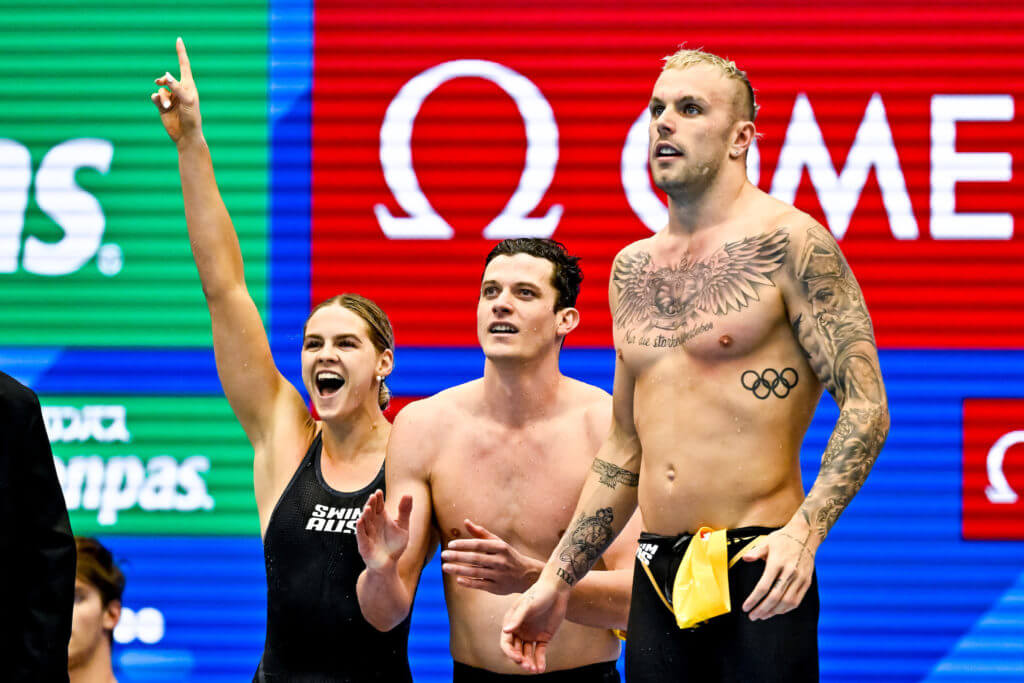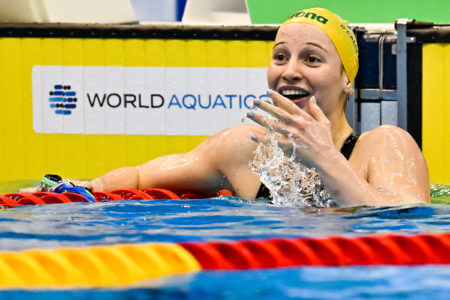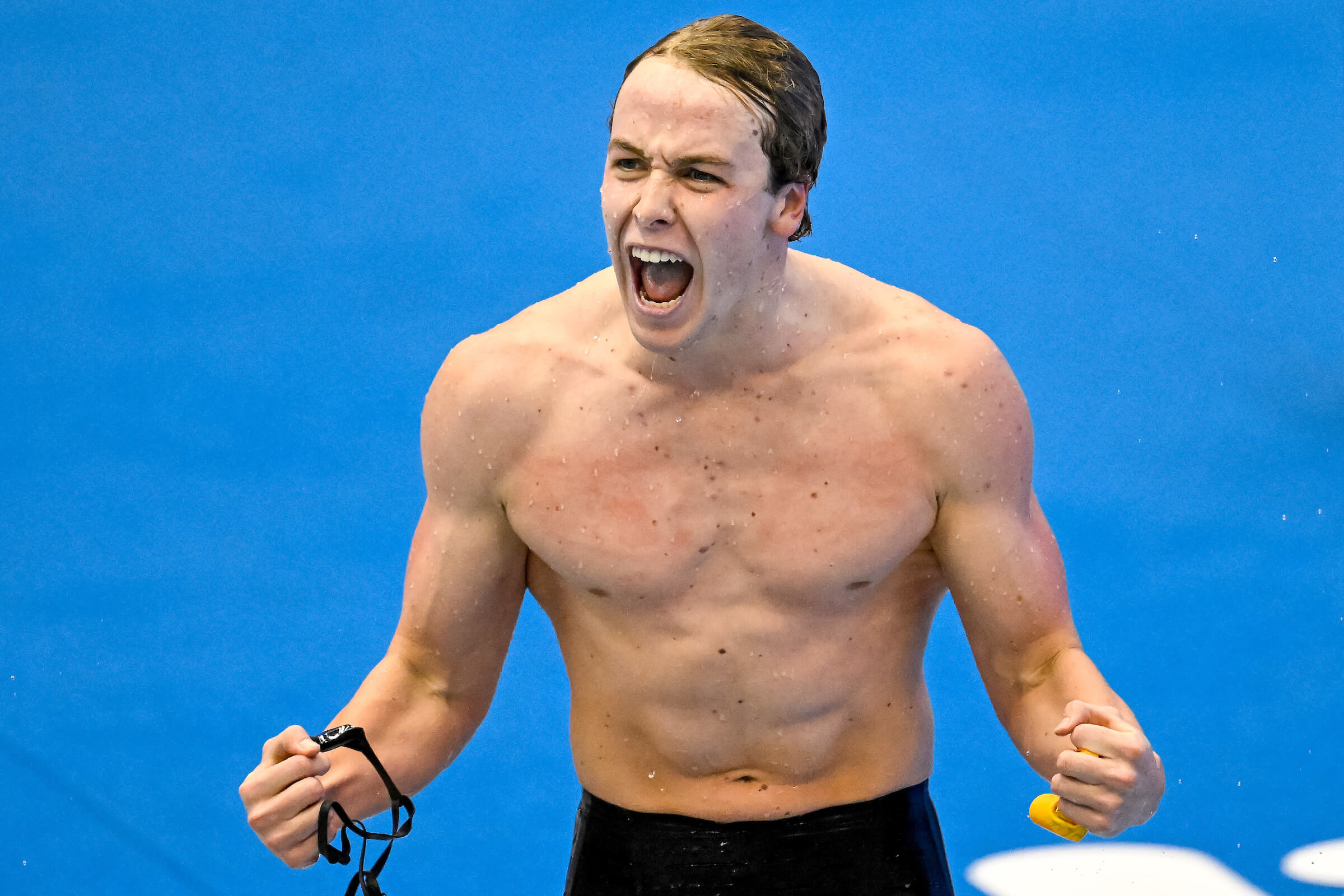Australia Claims Mantle as World’s Dominant Swim Team in Fukuoka

Editorial content for the 2023 World Aquatics Championships is sponsored by FINIS, a longtime partner of Swimming World and leading innovator of suits, goggles and equipment.

Australia Claims Mantle as World’s Dominant Swim Team in Fukuoka
Has Australia ever performed at such a high level at a major swimming competition? Perhaps in 2001, at the first World Championships held in Fukuoka, Japan, when the team had 13 gold medals. That meet was the signature performance of the legendary Ian Thorpe, who set world records in the 200, 400 and 800 freestyle while anchoring three gold-medal relays for Australia. Grant Hackett set a 1500 free world record that would last a decade while Petria Thomas swept the women’s 100 and 200 butterfly.
In swimming’s return to Fukuoka this week, the Aussies were arguably better. The meet started with a bang as Australia won four gold medals on night one, and the momentum continued from there.
Just like 2001, there were 13 gold medals and once again six different individuals earning gold. But instead of winning just three silver and three bronze medals in 2001, this Australian group collected seven silver and five bronze for 25 in total, the Aussies’ largest total-medal tally ever at a global-level competition. Twenty-three of those medals came in individual events, surpassing the 21 medals the Dolphins won at the Tokyo Games while also earning four additional golds. So what Australia had merely two individual world records this time?

Mollie O’Callaghan — Photo Courtesy: Andrea Masini / Deepbluemedia / Insidefoto
For the majority of the two decades since Thorpe and Hackett’s prime, the Australian women have been superior to their male counterparts, and that pattern held through these championships. Mollie O’Callaghan won five gold medals, including individual golds in the 100 free and 200 free (in world-record time) as well as three relays while Kaylee McKeown swept the women’s backstroke events, earning the honor of meet’s top female swimmer for her efforts.
Take your pick between those two for Female World Swimmer of the Year, but it’s likely that Australia will win the award for a third consecutive year with a third different swimmer.
The previous two winners of that honor were involved in Australia’s efforts as well. Ariarne Titmus won the so-called “Race of the Century” with Summer McIntosh and Katie Ledecky by simply dominating the 400 free and reclaiming the world record. Titmus also took silver behind O’Callaghan’s world record in the 200 free and bronze in the 800 free, hitting lifetime-best marks in both. Emma McKeon had a quiet week individually but still contributed to three relay medals. Meanwhile, Elizabeth Dekkers, Shayna Jack and Jenna Forrester all reached the podium for the first time at a global-level competition.
For the men, Australia was supreme in the freestyle events. Kyle Chalmers finally grabbed his long-awaited long course world title in the 100 free, and his anchor-leg magic propelled the Aussies to their first world title in the men’s 400 free relay in 12 years. Cameron McEvoy might be the comeback-of-the-year story. McEvoy did not race in 2022 after failing to advance out of prelims at the Tokyo Olympics, and he had not won an individual medal at a World Championships (or Olympics) since 2015. But the 29-year-old dominated the 50 free in Fukuoka, with all three of his times faster than any other swimmer posted all meet.
And in Sam Short, Australia has its best freestyler since Hackett and Thorpe. He is the first Aussie man to win three individual medals at a single Worlds since — yep, you guessed it — Hackett in 2005, when he swept the 400, 800 and 1500-meter races and earned 200 free silver behind Michael Phelps. Short opened the meet with gold in the 400 free, outdueling Ahmed Hafnaoui in a furious finish, and he went on to take silver behind Hafnaoui in the 800 free and bronze behind Hafnaoui and Bobby Finke in the 1500 free.
“I had nothing to lose going into this 1500,” Short said after he led early in the 1500 free final and ended up swimming a best time by nine seconds on his way to bronze. “I don’t think anyone expected me to get on the podium in this one. I’m pretty sure I took it out sub-3:50 in the first 400, which I don’t know if that’s been done before. It might not be the smartest move, but it paid off.”

Sam Short — Photo Courtesy: Andrea Staccioli / Deepbluemedia / Insidefoto
Short’s 800-meter performance broke Hackett’s Australian record that lasted 18 years, and he ranks second all-time among his countrymen in the other two races: behind Thorpe in the 400 and behind Hackett in the 1500. In the last decade, several Aussies have emerged in hopes of following up Thorpe and Hackett in the longer freestyle events, and several achieved success, with Mack Horton claiming 400 free Olympic gold in 2016 plus an impressive collection of international hardware while Elijah Winnington was the 400 free world champion last year. But Short is the first true triple-distance threat, and he doesn’t turn 20 until mid-September.
Not everything went perfectly for Australia, of course: McKeown was disqualified in the 200 IM semifinals for an illegal backstroke-to-breaststroke turn, and she would have been a legitimate gold-medal contender in the final. Zac Stubblety-Cook lost his world title and world record in the 200 breaststroke, but on his way to silver, he surpassed his winning time from last year and nearly matched his Olympic-gold-medal winning time from 2021. Can’t blame Stubblety-Cook for Qin Haiyang’s explosion in the breaststroke events.
As for relays, this meet marked the first time in 15 years, since the 2008 Olympics, that every Australian relay reached the podium. The quest to go eight-for-eight in relay medals was looking shaky entering the men’s 400 medley on the final evening, but Bradley Woodward and Stubblety-Cook kept their team in the mix before Matt Temple recorded the second-fastest butterfly leg and Chalmers once again came home on fire, doing enough to get 26-hundredths ahead of France for the bronze.
World Aquatics selected the United States as the top team of the meet based on overall medal count and quantity of finalists, but no team could match the dominance of Australia this week, with its 13 gold medals nearly doubling the Americans’ seven (which the U.S. only achieved after a final-day surge). The combination of returning veterans with individual Olympic hardware (Chalmers, McKeown, Titmus and Stubblety-Cook) with a pair of 19-year-olds continuing to upstage their more-established rivals (O’Callaghan and Short) proved magical.
The Aussies’ position at the top could be fleeting: the Americans will undoubtedly return stronger in the next test for global supremacy at next year’s Paris Olympics, particularly after their abundance of silver and bronze medals this week. But Australia now has built a track record as the team that shows up in major moments, when medals and reputations are on the line. That’s the team that got it done under pressure this week.
For the first time in decades, Australia is the world’s premier swimming nation.


- MEET HOMEPAGE
- COMPETITION SCHEDULE
- ENTRY LISTS
- 2022 WORLD CHAMPIONSHIPS
- LIVE RESULTS
- DAY 1 PRELIMS RESULTS
- DAY 1 FINALS RESULTS
- DAY 2 PRELIMS RESULTS
- DAY 2 FINALS RESULTS
- DAY 3 PRELIMS RESULTS
- DAY 3 FINALS RESULTS
- DAY 4 PRELIMS RESULTS
- DAY 4 FINALS RESULTS
- DAY 5 PRELIMS RESULTS
- DAY 5 FINALS RESULTS
- DAY 6 PRELIMS RESULTS
- DAY 6 FINALS RESULTS
- DAY 7 PRELIMS RESULTS
- DAY 7 FINALS RESULTS
- DAY 8 PRELIMS RESULTS
- DAY 8 FINALS RESULTS




If your headline were true, why was the US awarded the top team award?
because the judges were biased?
Because it’s based on points given for top 16 finishes. USA is the only country who can afford to send everyone who qualifies, so it’s basically mathematically impossible for them to lose.
if Australia wins gold in an event and USA gets 7th and 8th, USA “wins” that event… which we all know if rubbish
Does anyone sincerely believe that China , Australia or any other major nation is leaving legitimate medal contenders at home due to budgetary constraints?
BTW, pretty sure the US got more seconds and thirds than sevenths and eighths.
The Aussies had six swimmers who scored individual gold. The US had four. Congrats, but that hardly amounts to world domination.
I’m just telling you why the system is bad. If USA got 7th and 8th in an event and Australia broke a WR, USA would be considered the “winner” using that points system. If you think that’s a good system then you can’t be helped.
Australia’s entire budget is about 1/8th of just the value of NCAA scholarships. That’s not even including any money actually spent by USAS. You’re delusional if you don’t think other countries have stricter criteria because of resource management.
You can try to manipulate the data all you like, but Australia won 13 gold medals to USA’s 7 and broke 5 world records to USA’s 0.
Find me one American swimmer who would rather have your results than Australia’s. You can’t.
Look at this way. Take the recent Worlds results, but eliminate all nations except the US and Australia (as if it were a dual meet). Then look at only the top finishes of each event (i.e., ignore second, third, etc.). What do you get? Answer: US – 24 (21 individual; 3 relays); Australia – 18 (13 individual; 5 relays).
As for your “delusional” comment, take a look in the mirror, mate.
It is beyond ridiculous that Australia who won 13 gold medals to USA 7 and who broke 5 world records to USA zero was not named ‘Best Team’ at Fukuoka.
It’s depends on what you’re counting. The Aussie’s no question had a great meet. They had the most Gold Medals and WR’s and that’s certainly what they’re counting. But score this meet in any standard way, a straight up duel meet to any Championship meet format used and the U.S. easily wins with their vastly superior depth across all event, even while totally underachieving here.
This is not a dual meet. No other country sends every person who qualifies. You may as well just call it the “USA Trophy” because it is literally impossible for any other team to win regardless of results.
I don’t get your argument as it failed to address anything I said. I never claimed it was a duel meet. But if you are saying Australia couldn’t send all the people they wanted due to cost or something else, that’s ridiculous. Their airfare certainly had to be less than what the US team had to dole out.They’re one of the wealthier countries on the planet and swimming is perhaps their top sport internationally.
You only need to look at how the top nations are decided at the olympics to understand why Australia came out on top at this meet.
The big reason seems to be the appointment of Rohan Taylor as Head Coach, prior to his appointment in late 2020 Australia had trouble translating good performances at trials to equivalent performances at global meets. Since Taylor has taken the helm Tokyo and Fukuoka have produced outstanding performances from the Dolphins.
Rohan Taylor is obviously managing the swimmers and coaches magnificently, and being able to allow great coaches like Boxall, Bohl etc. to concentrate on what they do well.
The team culture is also morphed into a winning mind set, as well having very happy swimmers- the later is extremely obvious.
Lastly a big shoutout to Chanel 9 in Australia on a great coverage of the swimming. Intelligent, intelligent insightful and knowledgeable commentary from Giaan Rooney and Ian Thorpe and thoughtful and insight leads and discussions by anchor Nick McArldle. Well done Chanel 9 please keep the same crew together for Paris (if Chanel 9 has the rights)
Well said. Agree with coverage and no egos or stars. Thorpe commentary very insightful
US had 38 medals, the Aussies had 25. The 38 would win any scored swim meet.
This is not a dual meet. No one in the world would prefer 7 golds over 13 and 0 world records over 5. Ever.
Internationally, the rest of the world and the Olympics measures the winning team based on the most Gold medals. Always has and to USA’s credit, USA has dominated this contest. Australia and the rest of the world do not have college meets and scoring systems like being mentioned here. On the selection question, Australia does not send all of its athletes that meet the meet cut of times. Australia swimming requires swimmers to meet a time that would have made the A Final from the previous year, otherwise they don’t make the team. As such they leave swimmers at home.